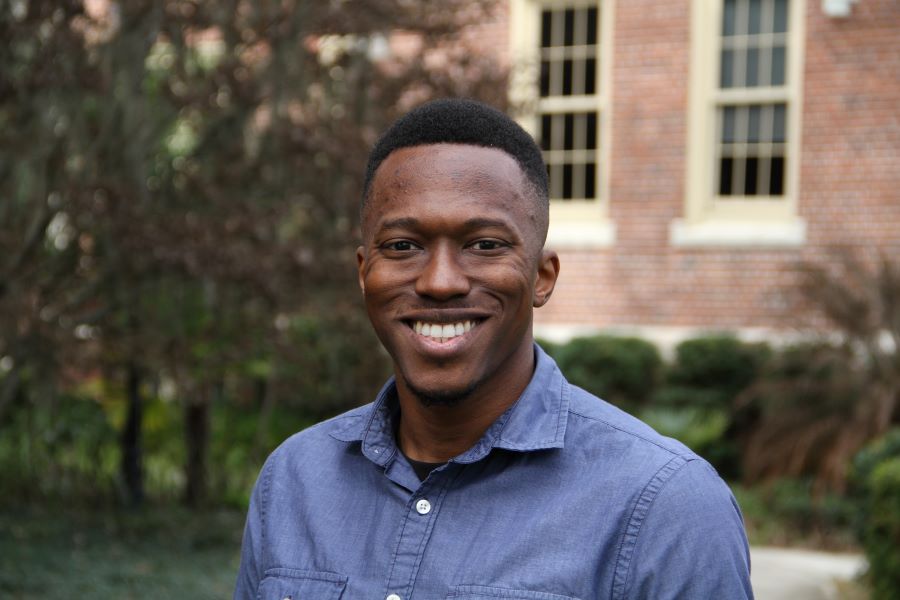Student Spotlight: Jackson Powell

Jackson Powell is a doctoral student studying ecology and evolution in the Department of Biological Science, part of Florida State University’s College of Arts and Sciences. Powell researches adaptive evolution in underwater organisms, and as an experienced diver, he has explored the Gulf of Mexico, French Polynesian coral reefs, and many nearby coastal waters. He is also a mentor in the FSU chapter of the National Science Foundation-founded Florida Georgia Louis Stokes Alliance for Minority Participation program in Science, Technology, Engineering & Mathematics, which aims to increase the participation of historically underrepresented populations in STEM academics and career fields.
What year are you in school, and when do you expect to graduate?
I am in my seventh year of my graduate program. I expect to graduate in the fall of 2023.
Tell us a little about your background, where you’re from, and what made you choose FSU.
I was born in Maryland and moved to California in elementary school. I grew up in Corona, Calif., and pursued my undergraduate degree in biological science at California State University in Los Angeles. I chose to attend Florida State University for my doctoral degree because the research performed at FSU aligns with my own research interests. I also enjoy Tallahassee’s proximity to my family and the ocean.
What inspired you to pursue your degree in ecology and evolution? Did you always want to pursue this field?
I have been interested in ecology and evolution since I was a child. I visited the National Aquarium in Baltimore, Md., when I was younger and became fascinated by oceanic organisms. I carried my dream to become a marine biologist with me as I was again inspired by sea jellies in the Kreisel tanks at the Aquarium of the Pacific in Long Beach, Calif. Eventually, I decided to pursue a career where I could work with these creatures closely.
Who are the faculty or staff members that have helped or inspired you?
There are several people who helped me continue my path in biology. My college financial aid adviser encouraged me to pursue biology in college, despite my lack of confidence in my GPA at the time. My lab instructors at Cal State first introduced me to research and how to gain experience in laboratory settings aside from off-campus internships.
Tell us about your research experiences, particularly your experiences in diving, and what you learned while out in the field.
I started conducting research as a junior in undergrad. During my first project, I studied how salinity interacts with evolutionary traits in marine slugs. I also participated in an internship during my undergraduate career where we investigated whether another species of deep-sea urchin could serve as an alternative to the current species that is fished for sushi cuisine.
I started diving when I entered graduate school at FSU. While my research does not require diving, I spend much of my time assisting others with their research as a scientific diver. Most of my diving experiences have been in the Gulf of Mexico where I have assisted in transplant experiments and collections of marine organisms.
I have also explored the French Polynesian corals reefs through the American Academy of Underwater Sciences to assist in research on genetic variation and size of coral species before and after a bleaching event. It can be difficult to communicate properly underwater, so I’ve learned the importance of clear communication before and after a dive to ensure everything runs smoothly. Knowing our limits is also important, as emergencies can be especially challenging when you are diving far away from emergency facilities.
You serve as a mentor in the FSU chapter of the Florida Georgia Louis Stokes Alliance for Minority Participation program (FGLSAMP) in Science, Technology, Engineering & Mathematics. Why is this role important to you and your career?
FGLSAMP is important to me because it is a national organization that works to address the lack of minority representation in STEM fields. Many minority students in STEM report that their feelings of estrangement in university settings is caused by a lack of role models, mentors, and instructors who share their cultural backgrounds. FGLSAMP provides opportunities for students to meet with mentors one-on-one, so the program allows me to connect with undergraduate mentees in ways I wish I experienced as an undergraduate student. Representation matters, so serving in this mentorship role for younger students is an honor.
How has your role as a student researcher prepared you for academic and professional success? Where do you anticipate your research will lead you in your career?
Nearly every career at the doctoral level requires experience with research, so conducting research is the best way for me to prepare for a successful career in biology. Several careers in academia directly involve research, so my experience with reading literature, brainstorming research questions, conducting lab work, and publishing results is crucial to my professional journey. I anticipate my research will lead me to a career where I can distill key biological topics and summarize them for others.
What do you like to do when you’re not doing schoolwork or research?
When I am not actively working on tasks related to my degree, I am teaching or grading. When I am not working, I enjoy playing video games and creating story narratives through drawings.
Although you might miss FSU, what are you most looking forward to after you earn your Ph.D.?
I have been a full-time college student since 2011, so I am extremely excited to graduate from that status. I look forward to further focusing on research objectives that interest me and exploring my professional opportunities in the world of biology as a lifetime learner.
